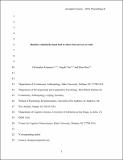Files in this item
Bonobos voluntarily hand food to others but not toys or tools
Item metadata
| dc.contributor.author | Krupenye, Christopher | |
| dc.contributor.author | Tan, Jingzhi | |
| dc.contributor.author | Hare, Brian | |
| dc.date.accessioned | 2018-10-15T08:30:11Z | |
| dc.date.available | 2018-10-15T08:30:11Z | |
| dc.date.issued | 2018-09-12 | |
| dc.identifier | 256148617 | |
| dc.identifier | 9edc5078-6210-4c5e-9103-4806058ee829 | |
| dc.identifier | 30209230 | |
| dc.identifier | 85054050099 | |
| dc.identifier | 000444626300018 | |
| dc.identifier.citation | Krupenye , C , Tan , J & Hare , B 2018 , ' Bonobos voluntarily hand food to others but not toys or tools ' , Proceedings of the Royal Society B: Biological Sciences , vol. 285 , no. 1886 . https://doi.org/10.1098/rspb.2018.1536 | en |
| dc.identifier.issn | 0962-8452 | |
| dc.identifier.other | Bibtex: urn:88be3d6000b5f50e940fe702ef399faa | |
| dc.identifier.other | ORCID: /0000-0003-2029-1872/work/49140763 | |
| dc.identifier.uri | https://hdl.handle.net/10023/16215 | |
| dc.description | This research was supported in part by National Science Foundation Graduate Research Fellowship DGE-1106401 and European Commission Marie-Sklodowska Curie European Fellowship MENTALIZINGORIGINS to C.K. and National Science Foundation grants NSF-BCS-08-27552-02 and NSF-BCS-10-25172 to B.H. | en |
| dc.description.abstract | A key feature of human prosociality is direct transfers, the most active form of sharing in which donors voluntarily hand over resources in their possession. Direct transfers buffer hunter-gatherers against foraging shortfalls. The emergence and elaboration of this behaviour thus likely played a key role in human evolution by promoting cooperative interdependence and ensuring that humans' growing energetic needs (e.g. for increasing brain size) were more reliably met. According to the strong prosociality hypothesis, among great apes only humans exhibit sufficiently strong prosocial motivations to directly transfer food. The versatile prosociality hypothesis suggests instead that while other apes may make transfers in constrained settings, only humans share flexibly across food and non-food contexts. In controlled experiments, chimpanzees typically transfer objects but not food, supporting both hypotheses. In this paper, we show in two experiments that bonobos directly transfer food but not non-food items. These findings show that, in some contexts, bonobos exhibit a human-like motivation for direct food transfer. However, humans share across a far wider range of contexts, lending support to the versatile prosociality hypothesis. Our species' unusual prosocial flexibility is likely built on a prosocial foundation we share through common descent with the other apes. | |
| dc.format.extent | 476052 | |
| dc.language.iso | eng | |
| dc.relation.ispartof | Proceedings of the Royal Society B: Biological Sciences | en |
| dc.subject | Bonobo | en |
| dc.subject | Chimpanzee | en |
| dc.subject | Prosociality | en |
| dc.subject | Cooperation | en |
| dc.subject | Sharing | en |
| dc.subject | Human evolution | en |
| dc.subject | BF Psychology | en |
| dc.subject | QL Zoology | en |
| dc.subject | DAS | en |
| dc.subject.lcc | BF | en |
| dc.subject.lcc | QL | en |
| dc.title | Bonobos voluntarily hand food to others but not toys or tools | en |
| dc.type | Journal article | en |
| dc.contributor.sponsor | European Commission | en |
| dc.contributor.institution | University of St Andrews. School of Psychology and Neuroscience | en |
| dc.identifier.doi | https://doi.org/10.1098/rspb.2018.1536 | |
| dc.description.status | Peer reviewed | en |
| dc.identifier.grantnumber | 752373 | en |
This item appears in the following Collection(s)
Items in the St Andrews Research Repository are protected by copyright, with all rights reserved, unless otherwise indicated.

